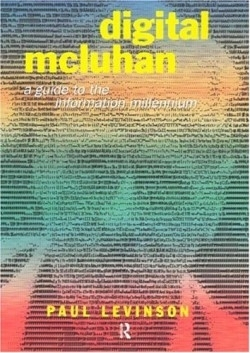Digital McLuhan
A Guide to the Information Millennium
In an era which renders obsolete the latest and greatest media technology almost as soon as it is unpacked from the box, Levinson seeks to understand the role of media in human affairs by re-examining the ideas of a man who died in 1980, at the dawn of CNN and more than a decade before Web pages. He makes an admirable case, as Marshall McLuhan was the sage who predicted the advent of the “global village” and asserted that “the medium is the message.”
Levinson, an award-winning science-fiction writer and Visiting Professor of Communications at Fordham University, was a student of McLuhan in the 1970s. Unfortunately, Levinson assumes that his readers are nearly as well-acquainted with McLuhan and his ideas as is he, so he does not take time to provide even basic biographical or background information on his subject, who published several books and articles on media and ended his career at the University of Toronto. Wired designated McLuhan its “Patron Saint” at its inception in 1993, and Levinson’s treatise will more likely appeal to its readers than to a mass audience.
Levinson’s enthusiasm for his former mentor’s ideas is absolute, and he seems compelled to defend McLuhan even against decades-old criticism. Levinson rebuffs charges that McLuhan’s arguments, when committed to print, were difficult to follow, by asserting that McLuhan was constricted by the printed page and would have been understood much better in the point-and-click hypertext domain of the Web page. Perhaps the same could be said of Levinson, whose commentary leaps from idea to idea and back again.
Interestingly, Levinson’s doctoral dissertation adviser was the astute Neil Postman, who is best known for his warnings against the blind acceptance of technology, particularly television and computers. An unabashed cheerleader of such technology, Levinson quips about his “failure” to convert Postman to the fan club.
In addition to defending and explaining McLuhan’s ideas, Levinson purports to carry on his mentor’s work into the digital age. This is where the book is most interesting and provocative. For instance, Levinson asserts that computer technology is the ultimate democratic media revolution because it finally frees information from the “gatekeepers,” i.e., editors, publishers and broadcast producers. True, any fifth-grader with Internet access can find a direct link to Kosovo, but how can one ensure that an unmediated information will be accurate, or worthy? And what will discourse, reason, education and culture be like in this global village? Would we want to live there? Levinson leaves serious discussion of those questions to Neil Postman.
Reviewed by
Sharon Flesher
Disclosure: This article is not an endorsement, but a review. The publisher of this book provided free copies of the book to have their book reviewed by a professional reviewer. No fee was paid by the publisher for this review. Foreword Reviews only recommends books that we love. Foreword Magazine, Inc. is disclosing this in accordance with the Federal Trade Commission’s 16 CFR, Part 255.

